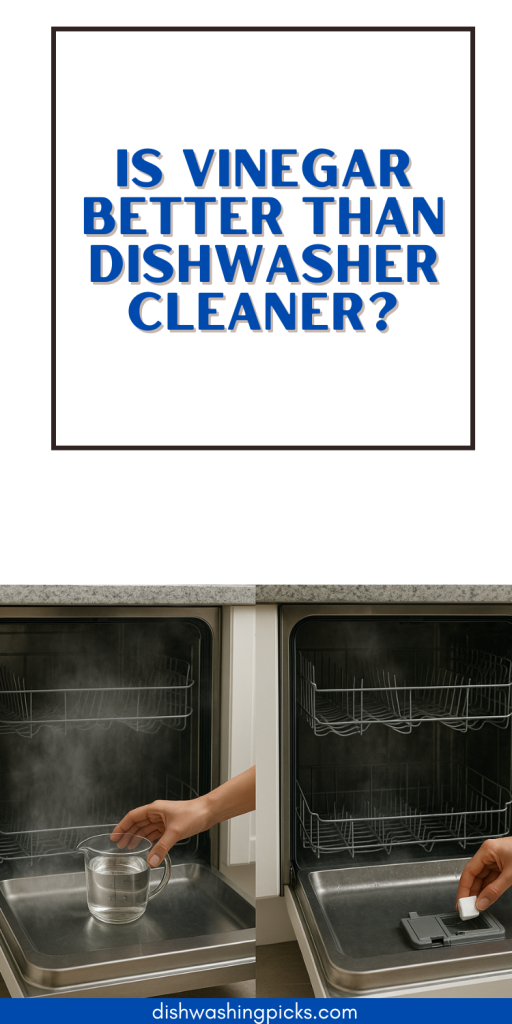
The Kitchen Debate No One Asked For…But Everyone Wants Answered
Okay, let’s be honest—at some point, you’ve stared into your dishwasher, sniffed a little funk, and thought, “Do I really need a fancy cleaner for this… or can I just grab the vinegar?”
If that sounds familiar, you’re not alone. Vinegar has long been hailed as the ultimate DIY magic potion—cheap, natural, and oddly satisfying to use. But how does it really stack up against those sleek, store-bought dishwasher cleaners with labels that sound like science experiments?
Let’s break it all down together. Grab your mug of coffee (or glass of wine, no judgment), and let’s dive in.
The People’s Cleaner
Let’s start with the crowd favorite—good ol’ vinegar. It’s basically the Swiss Army knife of cleaning products. Want to descale your coffee machine? Vinegar. Need to make your windows sparkle? Vinegar. Feel like freshening up the garbage disposal? Yep, vinegar again.
So, what’s it doing in your dishwasher?
Here’s what vinegar can do:
- Break down hard water deposits and limescale.
- Cut through mild grease buildup.
- Deodorize (bye, mystery smells!).
Sounds great, right? But there’s a twist. While vinegar is helpful, it’s also acidic. And that acidity? It doesn’t always play nice with rubber seals and dishwasher parts over time. Some manufacturers even say: “Use vinegar? Do it at your own risk.”
Imagine this: it’s like using lemon juice to clean your countertops. It smells amazing, but would you pour it on your electronics? Exactly.
Are They Just Fancy Vinegar?
Here’s the part where you might be wondering, “Wait—are these expensive cleaners just overpriced vinegar in disguise?” Fair question.
But here’s the deal: most commercial dishwasher cleaners are formulated—and that’s the key word—with ingredients that target specific issues: mineral buildup, grease, detergent residue, and bacteria. And they’re designed to be safe for your machine’s internal parts.
Many are even endorsed by appliance manufacturers. That’s like getting fashion advice from someone who actually sewed your outfit.
Some benefits of commercial cleaners:
- Targeted cleaning for jets, spray arms, and filters.
- Often more effective for deep cleans.
- Safer for your appliance in the long run.
Still, they cost more than a splash of vinegar. So… worth it?
So, Which One Wins?
Alright, moment of truth. Is vinegar better than dishwasher cleaner?
Well… it depends. (Ugh, we know, that’s not a dramatic verdict—but hear us out.)
For quick freshening or light cleaning? Vinegar can do the trick—just place a cup of it on the top rack and run a hot cycle (no dishes, please).
For deep cleaning or serious buildup? A commercial cleaner is your best bet. Especially if you live in a hard water area or haven’t cleaned your dishwasher in—well, a while.
Think of it like this: vinegar is your daily multivitamin. Dishwasher cleaner is your full-on wellness retreat.
What NOT to Do
Whatever you choose, please, please don’t mix vinegar with baking soda in the dishwasher and expect a miracle. That science fair volcano fizz might be satisfying, but it’s not doing much actual cleaning. In fact, it could mess with how your dishwasher drains.
Also—never pour straight vinegar on rubber seals regularly. It may erode them over time, and that’s a repair bill nobody needs.
Do What Works (But Do Something)
At the end of the day, the worst thing you can do for your dishwasher… is nothing at all. If you’re the type who only remembers to clean it when it smells like a wet dog wearing socks—this is your sign to do something.
Try the vinegar rinse for light upkeep. Use a commercial cleaner once a month or so for maintenance. Keep those filters clean. Your future self (and your dishes) will thank you.
And hey—if your dishwasher could talk, it’d probably say: “I don’t care what you use… just show me a little love now and then.”
